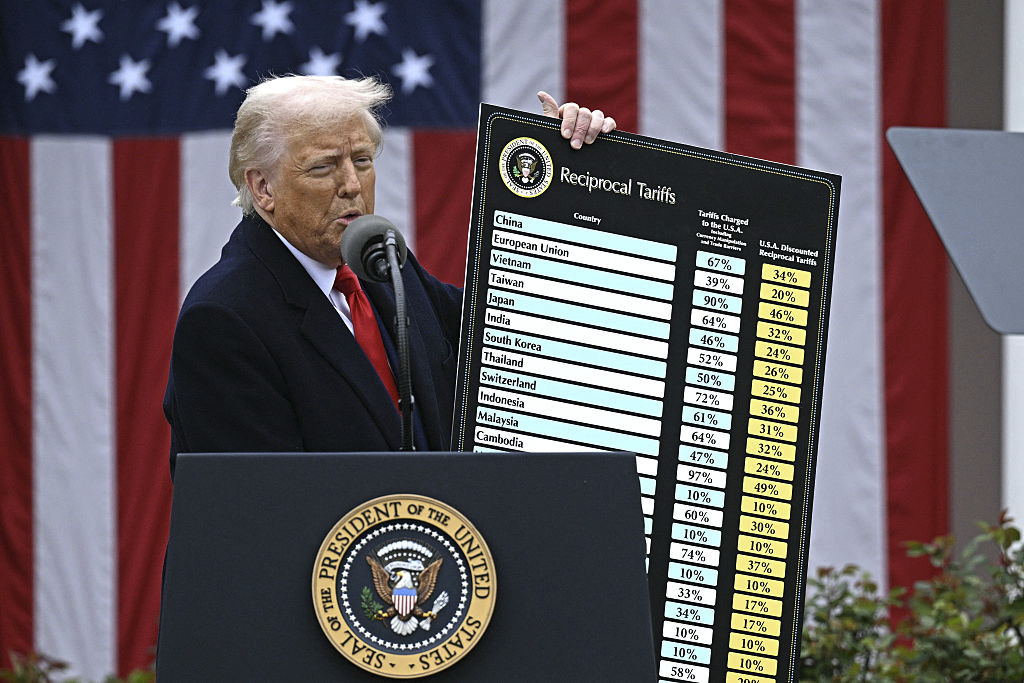
Despite the great deal of sound and fury that it has generated, it is perhaps too early to assess the lasting impact of President Donald Trump's latest fireworks on tariffs.
Some things, however, are certain.
Contrary to assertions by talking heads on the small screen, we are not heading for a global trade war.
True, the US is the world's biggest economy and ranks second as a trading power. But its share of world trade hovers around 12 percent, or under 10 percent of its GDP. The remaining 88 percent of world trade by 192 nations won't be immediately affected.
Moreover, almost half of US foreign trade is with its two neighbors, Canada and Mexico which had a tussle over tariffs with Trump in his first term but managed to reach a deal and are poised to do the same this time.
Apart from his blanket 10 percent tariff for all imports, higher tariffs have been suggested for some 60 countries, including the 30 or so that account for 40 percent of US foreign trade.
By the time of this writing, several of those had indicated readiness to negotiate a compromise. Even the European Union, which initially threatened hell and high fire, is beginning to realize that if you are in a hole, you stop digging. The forthcoming G7 summit may provide an opportunity for that.
Even China, which seems to have embarked on a game of chicken against the US, is almost certain to realize that it cannot afford a full-scale trade duel with the US.
Some pundits, like Columbia University's Professor Jeffrey Sachs, claim that tariffs suggested by Trump could lead to a recession.
To back that claim, they cite the Smoot-Hawley Act of 1930, which imposed a set of tariffs on US imports. According to Sachs, the act caused the Great Depression.
The erratic behavior of stock exchanges across the world in the past few days has raised the specter of another recession. I doubt that will happen. But even if it does, it would be the result of poor perception by financiers gripped by fear and greed. Factories around the world would continue to work and farms would not stop producing.
The Washington Post goes further by comparing Trump to President William McKinley, implicitly designating the US as an "imperialist" power. However, the paper forgets the key features of "imperialism," none of which apply to the US.
An imperialist power exports people whereas the US, thanks to immigration, has been a net importer throughout its history.
Trump is accused of protectionism. But here, too, a measure of protection is conducive to economic development. Without protectionism, Victorian England would not have been able to build its industrial revolution and create a global empire.
Bismarck's Germany would not have become 19th century Europe's industrial powerhouse. Similarly, the Japanese Meiji "miracle" was prompted by protectionist policies.
To be sure, too much protectionism could be deadly, as it discourages competition and innovation and rewards scientific and intellectual laziness.
Like Trump, Adam Smith, the father of economics as an academic discipline, was a fan of tariffs while holding up the free market as an ideal in which comparative advantages of all nations become operational. However, that ideal depends on that troublesome Latin phase; ceteris paribus (other things being equal).
In other words, availability of raw materials, presence of competitively priced labor, proximity to markets, standards of scientific and technological development, legal and political stability and regulations come into play. It is obvious that achieving parity in most if not all those domains isn't a realistic aspiration and that in any trading relationship one partner is at a disadvantage.
That fact now applies to the US, and is highlighted by its huge balance of payments deficit, overall indebtedness and the high tariffs it has faced throughout the globalization saga.
Trump tried to undo some of that disadvantage in his first term, and imposed tariffs that his successor Joe Biden, a champion of globalism, maintained.
Now in his second term, Trump intends to go further by addressing other problems inherent in the global system, including the vulnerability of supply chains and the danger inherent in strategic dependency on foreign sources of vital goods and services.
If the proposed scheme is really implemented, the US is likely to correct other problems, including the loss of industrial memory in many sectors, the downgrading of large areas of the country caused by shipment of jobs overseas and an addiction to relatively cheap and low-quality consumer goods.
An unintended consequence could be a reduction in the share of the US dollar in trade transactions.
Contrary to Trump's belief that the current "dollar is king" situation in world trade transactions is to the advantage of the US, a lowering of that profile could contribute to his other aspiration of sheltering the US from some of the uncertainties of a global system that could run out of control.
Amir Taheri was the executive editor-in-chief of the daily Kayhan in Iran from 1972 to 1979. He has worked at or written for innumerable publications, published eleven books, and has been a columnist for Asharq Al-Awsat since 1987.
Gatestone Institute would like to thank the author for his kind permission to reprint this article in slightly different form from Asharq Al-Awsat. He graciously serves as Chairman of Gatestone Europe.


